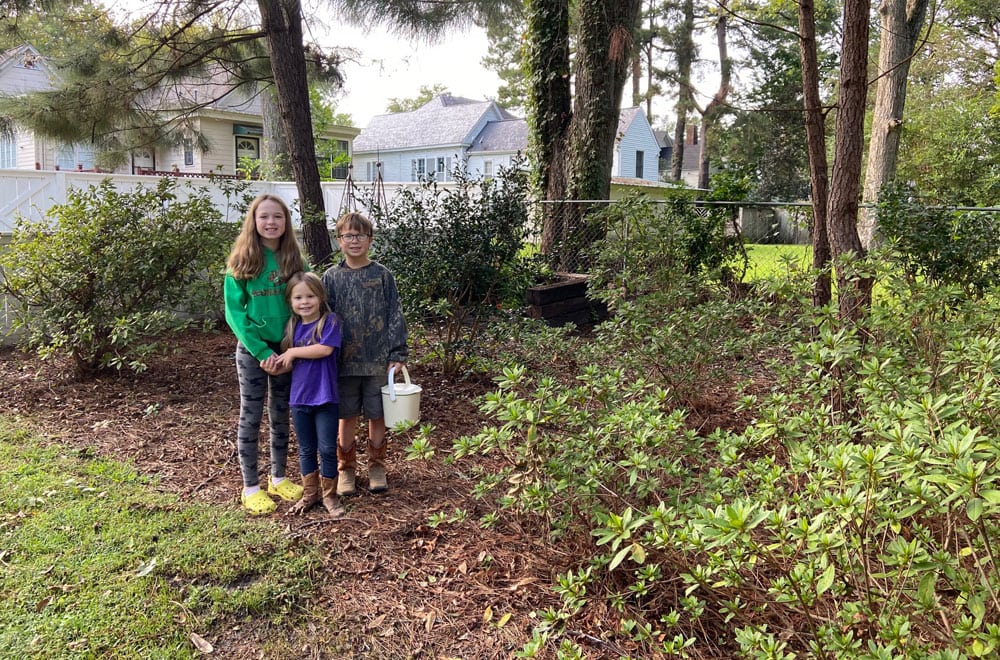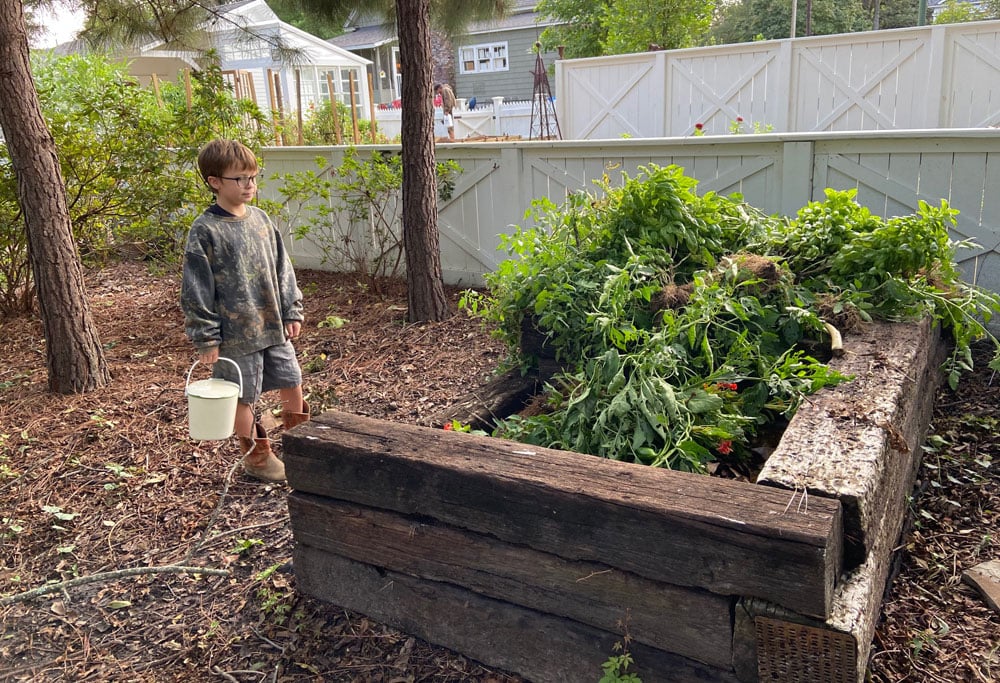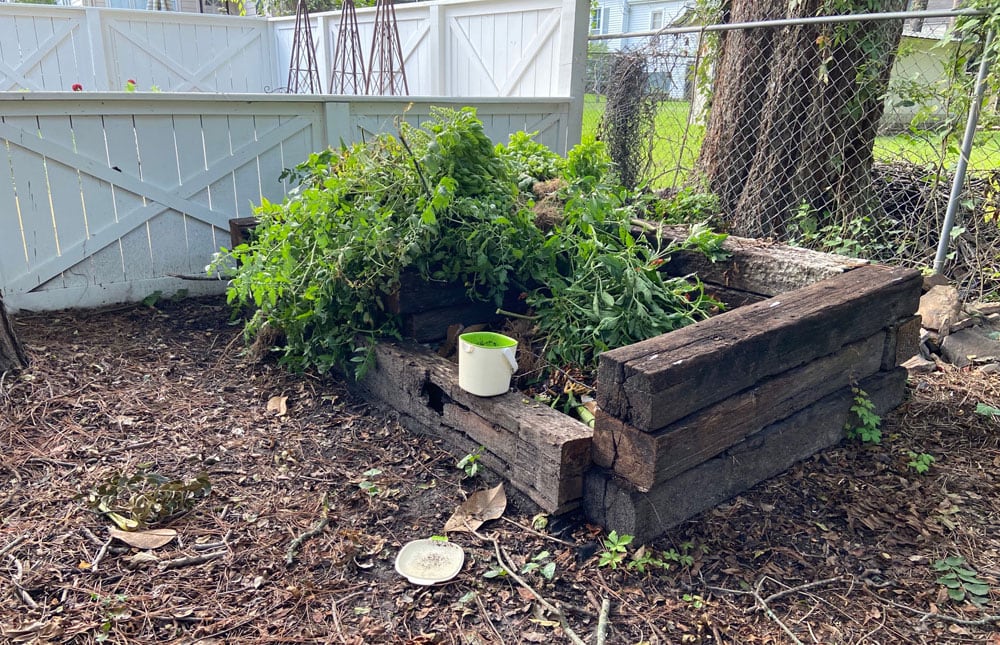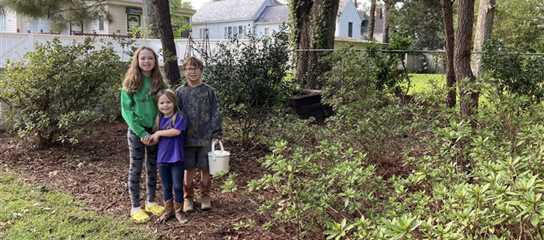Let your kids get their hands dirty by teaching them how to make a compost bin. Composting is a great way to build a sustainable home and teach stewardship and responsibility to your kids. Here are some benefits of composting with your family and tips on how to build a compost bin.

WHY COMPOST WITH KIDS?
As the nation continues to practice social distancing, you may be looking for ways to engage your kids without keeping them indoors all day.
Composting is a fun-filled activity that is suitable for the whole family. It gives your little ones an opportunity for hands-on learning about the environment, and it’s good for the planet. But, most of all, it’s a wonderful activity for helping families to connect and create long-lasting, good habits.
THE BENEFITS OF TEACHING YOUR FAMILY TO COMPOST
Composting with your kids offers a wide range of benefits for their minds and bodies, as well as for the planet. Some of the benefits of teaching your family to compost include:
1. Fosters a Love of Nature
For young children, this may be their first introduction to concepts like “nature” and “conservation.” Encouraging your kids to spend more time outdoors, observing natural processes like turning organic material into soil, can foster a love of the earth in your kids.
Research supports the importance of outdoor play for kids. Nature provides an alternative form of stimulation to promote mental growth, build confidence and independence, and instill a responsible mindset.
2. Promotes Sustainability
As part of the composting process, be sure to discuss with your kids the reasons your family composts and the importance of sustainability for preserving the planet. Composting is an important step toward creating a more sustainable household, and it can be practiced without a large backyard. A composting bin that fits neatly under your sink can produce enough soil to fill window boxes or potted plants.
3. Reduces Food Waste
Many kids are notoriously picky eaters, which leads to a significant amount of food waste. Composting helps you to reduce the amount of waste your household produces.
Compostable material includes fruit and vegetable peelings (excluding citrus), used tea bags, coffee grounds, plant trimmings, eggshells, and unbleached paper products like tissue or egg cartons.
4. Enriches the Soil
If your family enjoys gardening, composting can help you harvest a bumper crop next season. Adding compost to the garden enriches your soil with nutrients that help your fruits, vegetables, and flowers grow.
Composting can lead to healthier produce for your meals, and it helps your kids understand where their food comes from and how it grows.
5. Offers Teachable Moments
In addition to teaching your kids about nature and sustainability, composting offers the opportunity to turn an everyday task into an academic teaching moment. Kids can learn how to sort and identify compostable materials, observe how earthworms and other insects ingest and decompose food, and see the carbon cycle in action.

HOW TO TEACH YOUR KIDS TO COMPOST
One of the biggest advantages of teaching kids to compost is that it is easy to learn how to start a compost pile. With the right materials and a few tips and tricks, your whole family can enjoy the benefits of composting at home.
1. Start by Identifying Compostable Material
Your compost is only as good as the materials you put inside, so, before setting up a compost bin or learning the intricacies of decomposition, teach your kids which materials go in the compost and which don’t.
Get the kids involved with meal preparation and have them separate the compostable vegetable and fruit peelings from the non-compostable meat and dairy products.
2. Choose a Suitable Site
A compost bin needs moderate sun exposure to raise the internal temperature and catalyze the decomposition process. Choose a site that is in full sun most of the day. It should be on level ground with ample drainage. Make sure your compost bin is placed on bare soil so earthworms and other creepy crawlies can climb up through the compost.
3. Prepare Your Compost Bin
You can’t just buy a compost bin and start throwing in your scraps. This will produce noxious odors and cause a carbon-nitrogen imbalance in the system. Luckily, preparing your compost bin is simple, and the kids will love running around finding branches, leaves, and clippings to add to the compost bed.
Start by putting 4-6 inches of dead plants and twigs at the bottom of the bin to allow for aeration and drainage. Then, add a thick layer of dead leaf matter under a layer of fresh grass clippings with a layer of healthy soil at the top. Water the compost bed until it’s damp, but not dripping. Now your compost bin is ready to use.
4. Keep a Mini Bin on the Counter
Keeping a small bin to collect scraps on the counter is a visual reminder to the whole family to fill the compost bin. Have your kids empty the mini bin into the compost heap at the end of every day to teach responsibility and maintain their interest.
Keep a watering can, a shovel, and a tub of soil next to the compost bin so you can put a layer of soil on top of the scraps and water each layer until damp.
5. Organize Weekly Compost-Related Activities
Compost needs to be turned to expose every part of the organic material to the bacteria and bugs for decomposition and to aerate the compost with oxygen. Turning your compost speeds up the breakdown process. Schedule a weekly family activity to turn the compost.
Keep your kids engaged by asking kids to count the earthworms, or have a race to see who turns the compost fastest.

6. Use the Compost
Complete the natural cycle of growth and decomposition by using your fresh compost in the garden to help your plants grow. Give your kids a bucket of compost to sprinkle on flower beds, pot plants, or spread on the lawn.
You can teach your kids how to make compost tea by taking a pillowcase, filling it with six cups of compost, tying it to make a “teabag,” and then letting it soak in a bucket of water for 1-2 days. You can then use the compost tea to water your garden.
Composting is a wonderful family activity that promotes sustainability and a love of the outdoors. It offers teachable moments to learn about the science of nature, growth, and decomposition. At Mossy Oak, we have tips and advice on how to make the most of your outdoor experiences.


